
HUAREN MEDICAL TECHNOLOGY
STEM CELLS
Human umbilical cord mesenchymal stem cells and clinical therapy


▲Embryo in vivo (copyrighted image, please do not reproduce)
Human umbilical cord mesenchymal stem cells (HUC-MSCs) are a kind of pluripotent stem cells existing in the umbilical cord tissue of newborn babies, which have strong proliferation and self-renewal ability and can be differentiated into one or more kinds of human tissues or organs under certain conditions. Through autologous/allogeneic transplantation, the structure and function of tissues and organs can be reconstructed, and immune rejection can be avoided. It is because of these immunological properties of HUC-MSCs that they have broad clinical application prospects in autoimmune diseases and various alternative therapies. In recent years, HUC-MSCs have been widely used by the medical community in the treatment of various diseases, resulting in many successful cases.
01 HUC-MSCs
Treatment of lung injury in COVID-19 critically ill patients
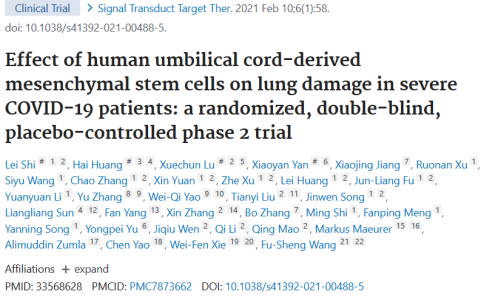
In February 2021, academician Wang Fusheng, director of the Center for Infectious Disease Diagnosis, Treatment and Research at the Fifth Medical Center of the General Hospital of the People's Liberation Army (PLA) and director of the National Clinical Medical Research Center for Infectious Diseases (NCCMRCID), and his team published an article on the study of "Effect of Human Umbilical Cord Mesenchymal Stem Cells on Lung Injury in Critically Ill Patients with COVID-19: A Randomized, Double-Blind, Placebo-Controlled Phase II Clinical Trial" in Nature's subspecialty journal Signal Transduction and Targeted Therapy [1].
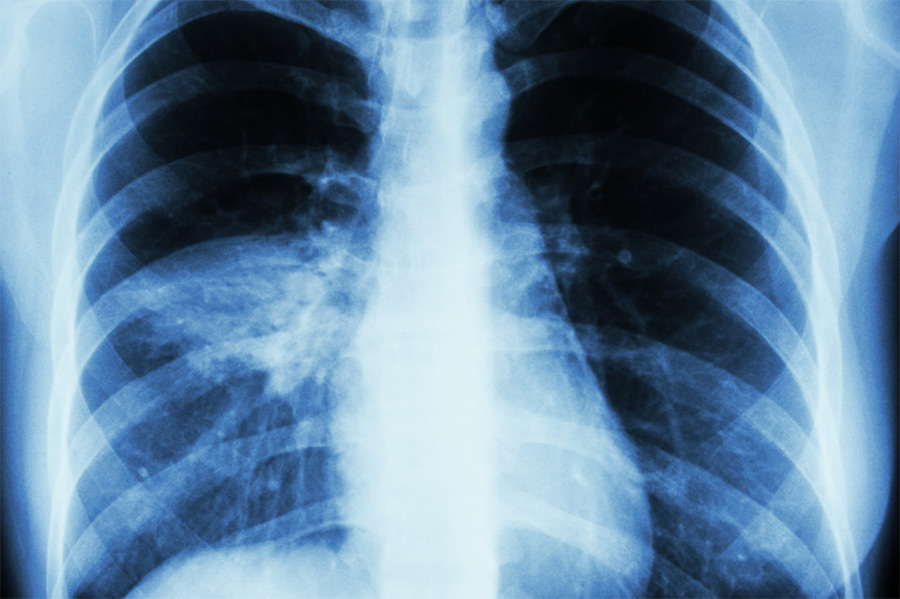
▲Pneumonia (copyrighted image.)
This study is the first randomized, double-blind, placebo-controlled clinical trial evaluating the potential therapeutic safety and preliminary efficacy of HUC-MSCs in critically ill patients with COVID-19 lung injury. In this study, study metrics such as proportional change in lesion areas throughout the lung, proportional change in solid and gross glass lesions, 6-minute walk test, lung function, and adverse events were assessed by injecting HUC-MSCs (n=65) or placebo (n=35) into each of 100 COVID-19 patients. The results showed that HUC-MSC accelerated the regression of solid lung lesions and improved the integrated reserve capacity of the lungs in COVID-19 critically ill patients and demonstrated good tolerability and safety, and that stem cell therapy may provide a safe and effective potential treatment option for patients with COVID-19 lung injury.
02 HUC-MSCs for diabetes
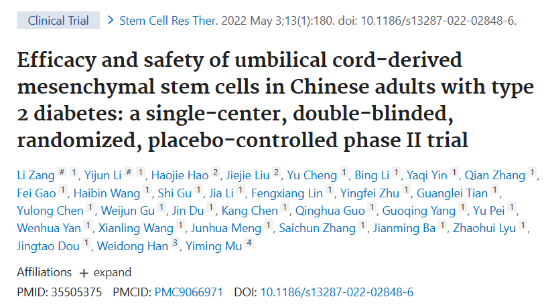
In May 2022, a team from the First Medical Center of the Chinese People's Liberation Army published an article in Stem Cell Research & Therapy about a phase II clinical trial on the efficacy and safety of umbilical cord mesenchymal stem cells for the treatment of type 2 diabetes mellitus in Chinese adults [2]. 91 patients with type 2 diabetes mellitus were enrolled in this single-center, double-blind, randomized controlled phase II clinical trial , which were randomized into a mesenchymal stem cell therapy (UC-MSCs) group (45 patients) and a placebo group (46 patients).The UC-MSCs group was given an intravenous infusion of 1×106 /kg for 3 infusions, each at 4-week intervals. The control group was given placebo infusion and followed up for 48 weeks. The results showed that at 48 weeks, ① at glycated hemoglobin (HbA1c) level <7.0%, there were 20% of patients in the HUC-MSCs group and only 4.55% of patients in the placebo group, which was a significant difference between the two groups (p<0.05); ② the HbA1c level in the HUC-MSCs group decreased by 1.31% and that in the placebo group decreased by 0.63%, which was a significant difference between the two groups (p=0.0081); ③ No relevant adverse reactions were observed in the HUC-MSCs treatment group. The results of the study suggest that HUC-MSCs treatment can reduce the HbA1c level of diabetic patients, reduce the daily insulin dosage of patients, and is a potential treatment for adults with type 2 diabetes mellitus (T2DM).
03 HUC-MSCs for the treatment of psoriasis
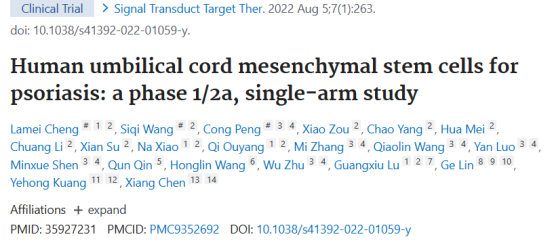
Psoriasis (commonly known as "psoriasis") is a common chronic relapsing inflammatory systemic disease that currently affects approximately 125 million people worldwide, resulting in an enormous disease burden. It is the longest-lasting immune-associated dermatosis with the greatest impact on the quality of life, and for which there is no cure. Despite major breakthroughs in targeted biologics and small molecule drugs in psoriasis, the initiating factors of the disease remain unclear. The disease tends to recur once the biologics are discontinued. The immunomodulatory ability of mesenchymal stem cells makes them promising as a novel therapeutic approach for the treatment of immune-related diseases in the clinic. Case reports of stem cell therapy for psoriasis have been reported internationally, but systematic and in-depth clinical studies are lacking.
On August 5, 2022, Xiangya Hospital of Central South University (CSU) completed the first international phase 1/2a single-arm clinical study using HUC-MSCs for the treatment of psoriasis (Registered Clinical Trial No. NCT03765957), evaluating the safety and efficacy of human UMSCs for the treatment of psoriasis and preliminarily exploring the possible mechanisms [3]. The study found that: transplantation of allogeneic UMSCs was safe and partially effective in patients with psoriasis, especially in women with psoriasis; lower levels of baseline Treg cell counts predicted a better therapeutic response and may be a predictor of effective treatment of psoriasis with UMSCs. In addition, this clinical study confirmed the effectiveness and safety of HUC-MSCs in psoriasis treatment, and explored its possible mechanism of action, which opens up a brand new medical technology for future psoriasis treatment, develops a new direction for psoriasis treatment, and represents a new breakthrough in the field of stem cell clinical research for psoriasis in China.
04 HUC-MSCs for the treatment of asthma
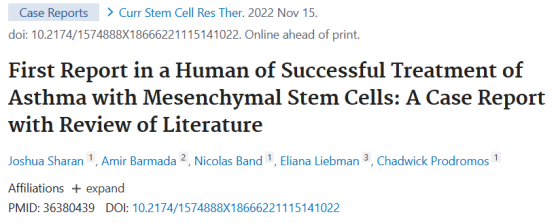
In November 2022, Joshua Sharan et al [4] published the world's first clinical case report of successful treatment of asthma with human mesenchymal stem cells: a 68-year-old male patient with a long history of asthma who was treated with an intravenous infusion of umbilical cord-derived mesenchymal stem cells (HUC-MSCs) experienced a 90% decrease in the use of the patient's emergency inhaler device and 70% decrease in the use of a nebulizer in the first two months after the treatment, and achieved significant and safe sustained improvement in the patient's clinical symptoms of asthma in the next six months.
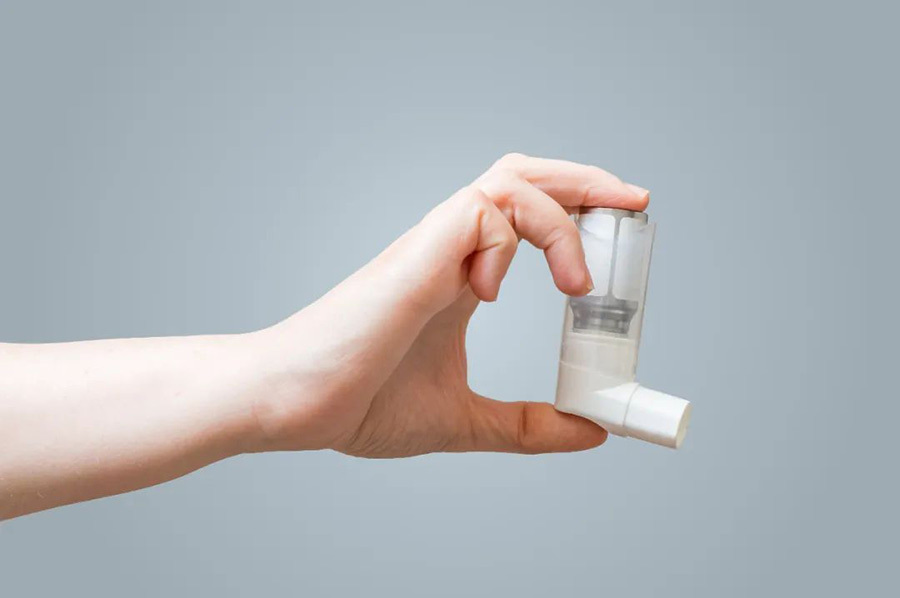
▲Inhaler for asthmatics (copyrighted image, please do not reproduce)
The authors also propose that the mechanisms of action include, first, MSCs can inhibit Th1 to Th2 cell differentiation and improve the Th1/Th2 imbalance in asthma. It can also reduce the expression of type 2-type cytokines and IgE, and can change the pro-inflammatory environment into an anti-inflammatory environment, in which the interaction between MSCs and T cells has a particularly significant effect on T cell activity. Second, bone marrow mesenchymal stem cells (MSCs) can exert their immunomodulatory function by secreting negative regulatory factors such as TGF-β1. At the same time, TGF-β1, in turn, can cause MSCs to migrate toward the airways in the asthma model. In addition, MSCs can also increase the number of Treg and improve their function. Finally, the anti-inflammatory and antifibrotic effects of MSCs may attenuate airway remodeling in chronic asthma.
05 HUC-MSCs治疗BOS
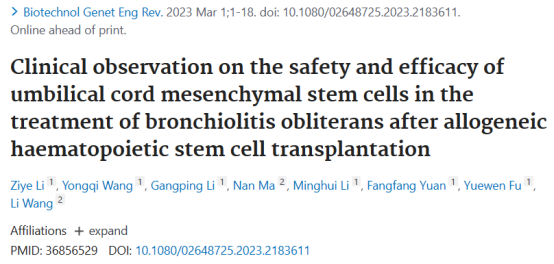
Bronchiolitis obliterans syndrome (BOS) is considered to be a serious complication after hematopoietic stem cell transplantation and may even be life-threatening.On May 1, 2023, a clinically observable study on the safety and efficacy of HUC-MSCs for the treatment of BOS after allogeneic hematopoietic stem cell transplantation was reported [5]. In this study, azithromycin, montelukast, glucocorticoids, and pirfenidone were administered to all patients who underwent allogeneic HSCT. The results of the study showed that after receiving HUC-MSCs, the clinical symptoms of BOS were significantly improved, such as the incidence of respiratory tract infections was reduced, and lung function indexes were improved. In addition, HUC-MSCs treatment did not lead to the development of adverse effects such as graft-versus-host disease (GVHD), and no significant safety concerns were identified during the follow-up period. Therefore, the authors concluded that HUC-MSCs is a safe and effective treatment for BOS.
06 HUC-MSCs combined with secreted proteomes for CPT treatment
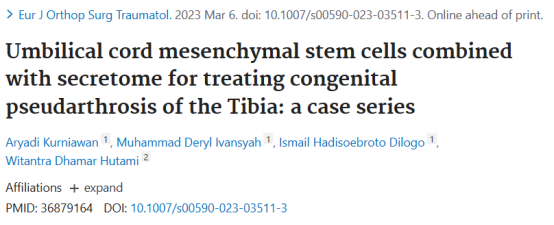
Currently, most patients with congenital pseudoarthritis of the tibia (CPT) are treated using conventional surgery, but the results are not favorable. While the combination of HUC-MSCs and its secretion (Secretome) contains key components that are essential for promoting fracture healing. on May 6, 2023, researchers performed a combination of treatments for six patients with CPT, as well as a combined surgery using locking plates and screw fixation [6]. The results of the study showed that the use of HUC-MSCs and their secretions led to a significant improvement in patients' postoperative symptoms, as well as a reduction in tibial healing time. At the same time, this combination treatment plan can effectively inhibit inflammatory reactions, promote tissue repair and reconstruction, and does not cause significant adverse reactions and side effects. This study suggests that HUC-MSCs combined with their secretions may become a new effective treatment for congenital tibial pseudoarthrosis, providing a new and promising option for the treatment of this disease. However, due to the small sample size of this study, more large-scale randomized controlled trials are needed to confirm its safety and efficacy.
07 summarize
HUC-MSCs are currently a highly regarded research hotspot in the field of regenerative medicine, with higher proliferative capacity, faster self-renewal, lower immunogenicity, and more reliable acquisition than MSCs from other sources. Although the functional mechanism of MSCs has not been thoroughly investigated, their therapeutic efficacy and safety have been preliminarily demonstrated in scientific studies, preclinical and clinical trials. As the heat of research and application of HUC-MSCs continues to rise, it is believed that it is bound to be widely used in the clinic in the near future and play a greater value for human health.


